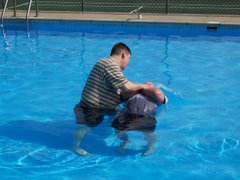When I first announced that we would be observing Lent at CrossRoad Church it created quite a stir amongst several members and frequent attenders. One well-meaning, but hopelessly sarcastic, friend even asked me if we were giving up being Baptist for Lent! For others it was no joking matter. There was concern on their part that we were doing something that identified us with the Roman Catholic Church and that was unhealthy. Today, as we prepare to kick off our observance of Lent, I thought I would make an effort to quell some of our members' fears and encourage all of you to use this time to seek a closer relationship with God as we prepare for Easter.
Isn't Lent a Roman Catholic thing?
The answer to this question is Yes and No. Yes, Roman Catholics observe Lent, but so do Presbyterians, Methodists, Anglicans, and Lutherans. Just because the Roman Catholic Church (RCC) observes Lent, however, does not mean that we are somehow sacrificing the gospel or identifying with the RCC with our observance. Lent, as a church observance, actually preceded the formation of the RCC by at least 200 years. The early Christian theologian Irenaeus (who was a disciple of Polycarp, who was himself a disciple of the disciple John), wrote of the early church's observance of Lent in the mid-second century. At that time Lent did not last forty days, but it was a pre-Easter time of preparation and focus for the church.
Granted, Baptists have not traditionally observed Lent (this reality is owed to our free church tradition and general eschewal of all things liturgical), but that does not mean that we should not or cannot take an extended period of time to prepare for our Easter celebrations.
The Who, What, When, and Where of Lent
When Lent first began to be observed in the church, it was common practice to baptize new Christians once a year. The baptisms took place on Easter. All new Christians were discipled (catechized) from the time they trusted in Christ until Easter when they were Baptized. The early churches, in an effort to help these young Christians grasp the significance of both their baptism and Easter celebrations, required them to fast for forty hours prior to their baptism. The fast was then broken after their baptism when the church celebrated its Easter feast. Gradually the entire church began to observe Lent as a way to prepare for their church's Easter celebrations. The length of time gradually was extended from forty hours to forty days. The number forty was intended to remind the Christian of the forty years the Israelites spent wandering in the wilderness and the forty days Jesus spent fasting alone in the desert prior to the public launch of his ministry that would carry him to the cross. The Israelites wandered because of their disobedience; Jesus purposely sought out the desert to fast and pray in preparation for his ministry, a ministry that would ultimately reconcile us to God the Father. The observance of Lent has remained forty days since that time.
But Why Lent?
Just because we have answered the question of the origins of Lent does not necessarily mean that we should observe it. We first need to answer the question of why. There are two reasons why I desire for CrossRoad Church to observe Lent. The primary reason has to do with the original intent of the observance. The early church asked new Christians to observe Lent to impress upon them the significance of their redemption and the celebration of Easter. Eventually it became important enough that all Christians were asked to observe it. I want the members of CrossRoad Church to use the next few weeks as a time to accomplish the same objective in their lives. That is why we have chosen the specific Bible studies and sermon emphases we will be following in the next few weeks.
The second reason why I desire for CrossRoad Church to observe Lent is because I want our folks to grasp the fact that we stand in continuity with early church and all those that have been redeemed by Christ in the past 2,000 years. The church did not start the day we were redeemed, it started the day of Pentecost. I want our church to develop a sense of their spiritual heritage.
If you have questions or comments I would love to hear them. Tomorrow I will unpack how we plan to observe Lent as a church.
A forum for theological discussion, application, and cultural commentary among the members of CrossRoad Church and anyone else in the body of Christ that would like to participate. Welcome!!!

- Chris Bonts
- "Nothing is so cruel as the tenderness that consigns another to his sin. Nothing can be more compassionate than the severe rebuke that calls a brother back from the path of sin." -- Dietrich Boenhoeffer
The Rainbow

Remember the promise not to destroy, but to redeem the world.


